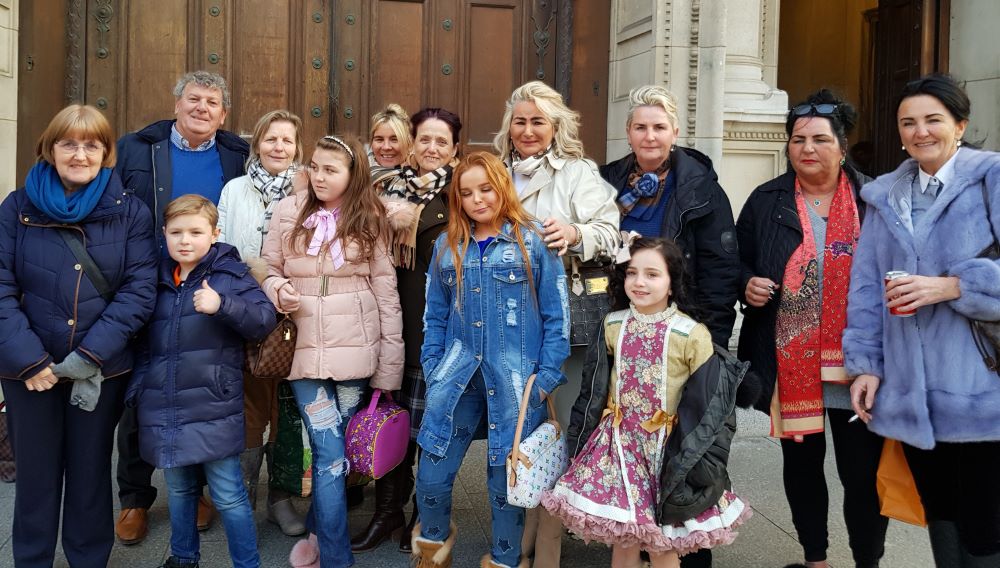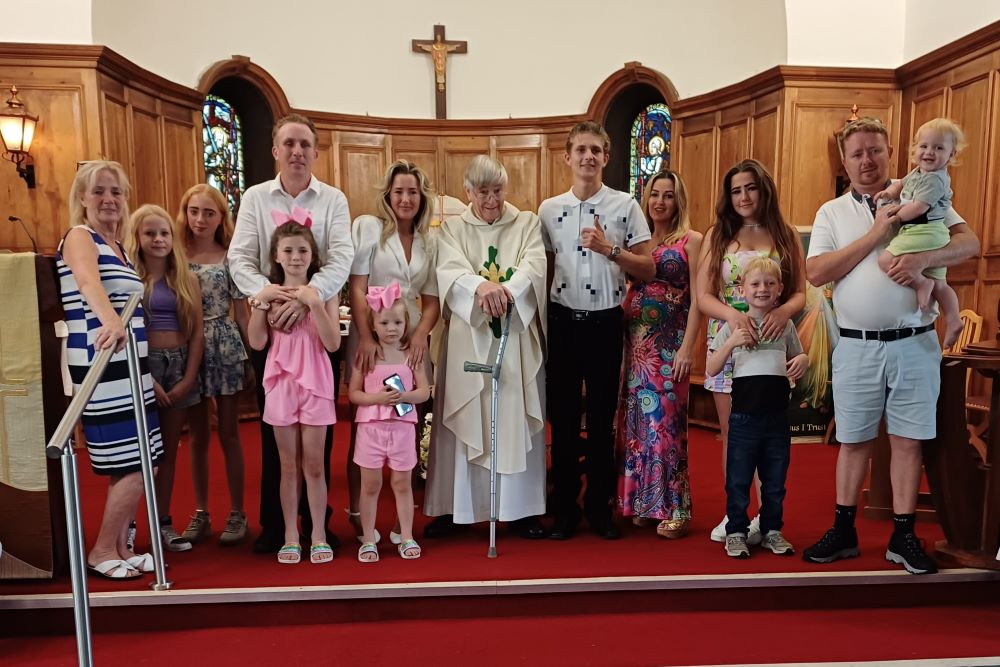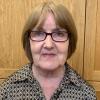
Presentation Sr. Bernadette Healey, far left, works with Irish Travellers, Gypsy and Roma groups in England, She is pictured with a group of Travellers at Westminster Cathedral, London. (Courtesy of Bernadette Healy)
I am a sister of the Presentation of the Blessed Virgin Mary, working in Nottingham, England, primarily with the Irish Travellers, Gypsy and Roma community. I have a wonderful team of volunteers and co-workers from the diocese who assist me in pastoral work with families, preparing children and youth for baptism, first Communion and confirmation, and adults for marriage. It is a wonderful ministry and very varied, including conducting classes to helping those who cannot read to reply to letters, fill out forms, apply for passports and whatever else might come up.
According to the Traveller Movement organization in Britain, Irish Travellers are a nomadic group of people from Ireland who have a separate identity, heritage and culture from the community in general. Irish Travellers' presence can be traced to 12th-century Ireland, with migrations to Great Britain in the early 19th century. The movement estimates about 300,000 Gypsy Roma and Traveller people currently live in Britain.
The organization estimates that Romani gypsies have been in Britain at least since 1515, migrating through Europe from northern India. The name "gypsy" was given by settled folk who mistook them as Egyptians because of their dark complexion. It is also known that there were Indigenous nomads in Britain when the new arrivals came.
According to the organization's website, the people live a variety of different lifestyles, some "on the road" and some living in mobile homes or caravans on council or private sites. Others settle in one place during school periods and travel during summer; while others live in permanent housing, but retain their culture and traditions.

Presentation Sr. Bernadette Healey works with Irish Travellers, Gypsy and Roma groups in Nottingham, England, Pictured is a Traveller family in Leicester, England. (Courtesy of Bernadette Healy)
Most of this community I work with grew up on a particular site, living in mobile homes or caravans. Living conditions are often cold and damp, and outdoor toilets are most common. Outdoor play areas for children are usually non-existent or unhealthy, at times infested with rats.
Living conditions are extremely crowded, so when a young couple marries, they cannot stay with their parents. They move into their own trailer, if lucky, or into a small flat, what we call a bedsit. At least they have a roof over their heads, but it separates them from the community, which is against their culture. Some live in emergency housing for the homeless, waiting for local authorities to help them find housing. Needless to say, it is very stressful for them. A submission in October 2018 to the Development of the Traveller Accommodation Programme 2019-2024 states that "Travellers are 11 times more likely to become homeless and 22 times more likely to be discriminated [against] by landlords."
Education is another challenge. Most children I encounter attend primary school to age 11 (75-85%), but at the point of transfer to secondary school, dropout rates are magnified, with only about 20% registering. There is still a cultural pattern of boys staying with their parents to learn a trade and girls staying home to learn skills for child care and housekeeping, with a belief that it is time to focus on Traveller life and identity. Another reason for not advancing in school is fear of bullying, drugs or promiscuity at the "big school."
Living such an alternative life brings with it the suffering of intense discrimination. When I was on a visit to one family with little income, they shared, "We are treated badly everywhere we go. We are living in awful conditions, and no one wants to help us, really." Another shared, "It's not what people say; at times, they are very careful. It's a feeling you get, that look that only travelers would know.The conversation stops. The side looks at each other. … it happens everywhere I go."
I have found The Traveller Movement very helpful in my ministry. This national charity is committed to the fulfillment of human rights for ethnic minority Gypsy, Roma and Traveller communities to achieve equality through self-determination and proactive participation in influencing and shaping policy.
It provides direct support and advocacy across a range of issues, including education, hate crimes and discrimination, and provides access to justice through early legal remedies. It also carries on research and policy advocacy and works in partnership with community and volunteer organizations to bring about social change.
Advertisement
The group assisted a family I know who were struggling with their electricity meter. Each week they put aside money for electricity but the local council refused to give them receipts, so they had no idea how much electricity they were using. They also had no running water and the site had not been upgraded since 1985. They described for me the conditions they lived in: "I can't afford to keep the place warm. The second the heater goes off, it is freezing. The children go to bed early with extra blankets. I sit up with a candle rather than turn on the lights because I don’t know if I can afford to." The Traveller Movement stepped in and is working with the council to bring the site up to current living standards.
Mental health is definitely impacted by these harsh conditions. Suicide rates are six times higher than they are in the general population and life expectancy remains much lower. Since COVID, suicide among youth and even children as young as 11 has increased. These young deaths have a devastating effect on family life, which is overcome by grief. Often, I wonder how in the world these families survive and keep faith.
Gypsies and Travellers are more likely to be self-employed than the general population. The men do driveway paving, home improvement and other industrial-type businesses, including scrap and home trading. Some sell cars, do metal work, paint, or do roofing or plumbing. Management and maintenance of local caravan sites are often well-managed by members of the community. Women often make and sell keychains, bracelets and earrings; resell clothing; and read palms as a form of income to support the family.
My own faith in God has been strengthened and enriched by living and working among these people because of their amazing deep faith and commitment to prayer and companionship. I also feel a strong kinship with our foundress, Nano Nagle, whose commitment sent her out each day to be with those kept poor by unjust systems. I often feel she walks beside me each day as I journey among these people.







